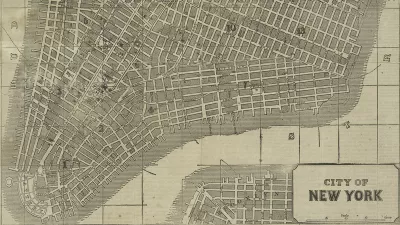Municipal comprehensive plans are neither necessary nor sufficient for smart growth.
A few months ago, I argued in a blog post that comprehensive planning (which I define narrowly as municipal comprehensive plans that override zoning codes)* is not sufficient to limit sprawl, because some cities' comprehensive plan provisions in fact promote automobile-dependent sprawl. In my post, I cited comprehensive plan provisions that promote single-use zoning, low density, and streets that are too wide to be safe for pedestrians.
It could be argued, however, that even if comprehensive planning is not sufficient to limit sprawl, it is in fact necessary to limit sprawl. But I doubt that this is the case, because many smart growth policies can be implemented either through local zoning codes or through statewide legislation.
The policies discussed in my earlier post provide excellent examples. Single-use zoning might make it harder for people to live within walking distance of shops and jobs. It is certainly possible that a local comprehensive plan could turn single-use zones into mixed-use zones- but a form-based code, or even a local zoning code amendment, could do the same thing. Similarly, statewide legislation could limit municipalities' power to engage in single-use zoning.**
Low-density zoning makes single-use zoning more oppressive, by ensuring that only a few people can live within walking distance of public transit or commercial streets. A city can reform such zoning without making comprehensive plans binding, or even without writing a comprehensive plan. For example, a city could in theory amend its zoning code to eliminate density regulation altogether. A city committed to more moderate reform can raise the maximum density in its lower-density zones to levels high enough to support regular bus service, and can raise the maximum density in its higher-density zones to levels high enough to support regular rail service. Similarly, statewide legislation could limit municipal power to regulate density.
My sense from reading a few codes is that cities typically address street design in subdivision regulations. These regulations can also be reformed even in the absence of a comprehensive plan; just as current subdivision regulations might favor six-and eight-lane streets, a smart growth subdivision regulation might limit commercial streets to three or four lanes.
In sum, comprehensive plans are just a procedural tool for regulating land use. Thus, many substantive goals that a city can achieve through plans can also be achieved through direct reform of zoning codes or through statewide legislation that limits municipal discretion.
Now, of course, one might argue that it is politically impossible to reform zoning codes or statewide zoning enabling laws. But if that's true, won't it be equally impossible to reform comprehensive plans?
*On the other hand one could define comprehensive planning more broadly as any set of broad rules designed to govern specific land use decisions. I concede that by under this broader definition, planning is indeed necessary to achieve any policy goal.
**On the other hand, statewide legislation may be less easy to amend, and thus less flexible, than local laws. The desirability of such statewide action is best left for another post.

Planetizen Federal Action Tracker
A weekly monitor of how Trump’s orders and actions are impacting planners and planning in America.

Maui's Vacation Rental Debate Turns Ugly
Verbal attacks, misinformation campaigns and fistfights plague a high-stakes debate to convert thousands of vacation rentals into long-term housing.

Restaurant Patios Were a Pandemic Win — Why Were They so Hard to Keep?
Social distancing requirements and changes in travel patterns prompted cities to pilot new uses for street and sidewalk space. Then it got complicated.

In California Battle of Housing vs. Environment, Housing Just Won
A new state law significantly limits the power of CEQA, an environmental review law that served as a powerful tool for blocking new development.

Boulder Eliminates Parking Minimums Citywide
Officials estimate the cost of building a single underground parking space at up to $100,000.

Orange County, Florida Adopts Largest US “Sprawl Repair” Code
The ‘Orange Code’ seeks to rectify decades of sprawl-inducing, car-oriented development.
Urban Design for Planners 1: Software Tools
This six-course series explores essential urban design concepts using open source software and equips planners with the tools they need to participate fully in the urban design process.
Planning for Universal Design
Learn the tools for implementing Universal Design in planning regulations.
Heyer Gruel & Associates PA
JM Goldson LLC
Custer County Colorado
City of Camden Redevelopment Agency
City of Astoria
Transportation Research & Education Center (TREC) at Portland State University
Jefferson Parish Government
Camden Redevelopment Agency
City of Claremont






























